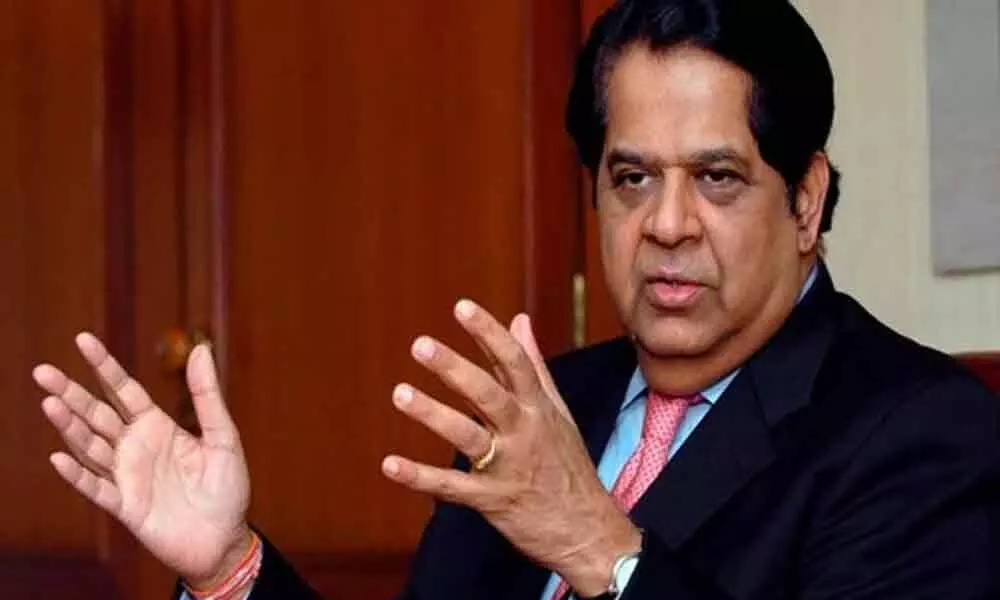KV Kamath committee submits Report on Resolution Framework for Covid-19 related Stress; Picks 26 sectors for restructuring

KV Kamath
The expert committee chaired by KV Kamath submitted its report on Resolution Framework for COVID-19 related stress to the Reserve Bank of India.
KV Kamath committee submits Report on Resolution Framework for Covid-19 related Stress; Picks 26 sectors for restructuring
The expert committee chaired by KV Kamath submitted its report on Resolution Framework for COVID-19 related stress to the Reserve Bank of India. The committee in its report submitted on September 4, 2020, recommended financial ratios of 26 sectors which could be factored by lending institutions while finalizing a resolution plan for a borrower.
In its report, the five-member committee said power, construction, iron and steel, roads, real estate, wholesale trading, textiles, chemicals, cement, consumer durables, aviation, logistics, hotels, restaurants and tourism, mining, non-ferrous metals, auto manufacturing, auto dealerships, auto components, pharmaceutical manufacturing, corporate retail outlets, port and port services, shipping, building materials and sugar will need restructuring.
The Committee has recommended five financial parameters that include aspects related to leverage, liquidity and debt serviceability among others. The committee selected five financial parameters where the threshold has to be recommended for each identified sectors in the terms of aspects related to leverage, liquidity, debt serviceability etc.
The selected parameters are:
1) Total Outside Liability / Adjusted Tangible Net Worth (TOL / Adjusted TNW)
2) Total Debt / EBIDTA
3) Current Ratio
4) Debt Service Coverage Ratio (DSCR)
5) Average Debt Service Coverage Ratio (ADSCR)
The five-member expert committee was formed by the Reserve Bank of India (RBI) on August 7, 2020, under the chairmanship of former ICICI Bank CEO KV Kamath to make recommendations on the required financial parameters to be factored in the resolution plans under the 'Resolution Framework for Covid19-related Stress' along with sector-specific benchmark ranges for such parameters. Other members of the committee are former State Bank of India executive Diwakar Gupta, current Canara Bank chairman TN Manoharan, consultant Ashvin Parekh and Indian Banks' Association (IBA) CEO Sunil Mehta who was also a secretary to the committee.
It had asked the panel to recommend a list of financial parameters, including leverage, liquidity, and debt serviceability, to decide on the resolution plan. The committee will also vet the resolution plans for all the accounts where the exposure is more than Rs 1,500 crore. The term of the committee has been extended till June 30 2021.
Reserve Bank of India in a statement said, "The recommendations of the Committee have been broadly accepted by the Reserve Bank. Accordingly, a follow-up circular to the Resolution Framework guidelines announced on August 6, 2020, has been issued today by the Reserve Bank specifying five specific financial ratios and the sector-specific thresholds for each ratio in respect of 26 sectors to be taken into account while finalising the resolution plans." It added, "In respect of other sectors where certain ratios have not been specified, the lenders shall make their own assessment keeping in view the contours of the circular dated August 6, 2020, and the follow-up circular issued."
Key Highlights of Resolution Framework dated August 6, 2020
Eligibility:
Resolution under this Framework extended only to borrowers having stress on account of Covid-19.
Only those borrowers which were classified as standard and with arrears less than 30 days as at March 1, 2020, are eligible under the Framework.
The committee in its report has said that signing the inter-creditor agreement (ICA) will require:
Resolution process shall be treated as invoked once lenders representing 75% by value and 60% by number (Majority Lenders) agree to invoke the same.
ICA to be signed by all lenders within 30 days of invocation.
Lenders who have signed ICA, to make provision, higher of 10% or IRAC norms.
Lenders who have not signed ICA, to make a provision higher of 20% or as per IRAC norms, upon expiry of 30 days from invocation
General Guidelines:
The residual tenor of the loan may be extended by a maximum of 2 years with or without payment moratorium. The moratorium period, if granted, shall come into force immediately upon implementation of the Resolution Plan (RP).
The asset classification may be maintained as standard or upgraded to standard subject to the resolution plan being implemented as per the Framework.
For aggregate exposures greater than Rs 100 crore, an Independent Credit Evaluation (ICE) to be obtained from anyone Credit Rating Agency authorised by RBI.
Conversion of Loans into Securities and Valuation:
Resolution plan to include restructuring/ regularization/ change in ownership, if any, the sanction of additional facilities.
Resolution plan may provide for conversion of debt into equity or other marketable non-convertible debt securities provided amortization and coupon are similar to terms of debt.
Equity to be valued as per lower of breakup value or DCF value (for unlisted companies) and market price (for listed companies).
Any other instrument to be valued at Re.1.
Post Implementation Performance:
In respect of exposures, any default by the borrower with any of the signatories to the ICA during the monitoring period shall trigger a Review Period of 30 days.
If the borrower is in default with any of the signatories to the ICA at the end of the Review Period, the asset classification of the borrower with all lending institutions, including those who did not sign the ICA, shall be downgraded to NPA from the date of implementation of the resolution plan or the date from which the borrower had been classified as NPA before the implementation of the plan, whichever is earlier.
In all cases, further, up-gradation shall be subject to the implementation of a fresh restructuring under the Prudential Framework, or the relevant instructions as applicable to a specific category of lending institutions where the Prudential Framework is not applicable








